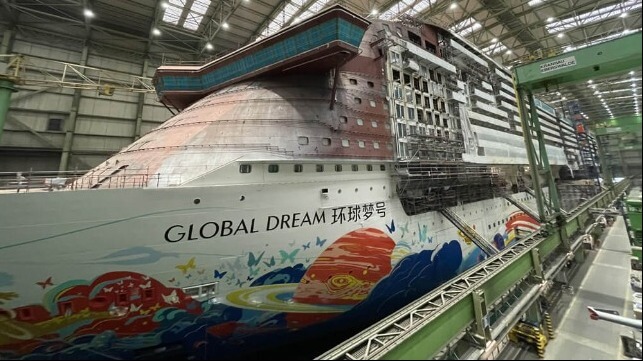MV Werften Liquidator Still Seeks Buyer for Global Dream

Liquidators focusing on resolving the assets from MV Werften, Genting Hong Kong’s failed German shipbuilder, are continuing to look for a buyer for the nearly-completed giant cruise ship named Global Dream. They are denying media reports this week that they were considering auctioning off the cruise ship to clear the building hall in Wismar, Germany. They however are offering to sell equipment at the shipyard that was to have been used for a sister ship.
Speculation has grown over the fate of the cruise ship which would become the largest capacity passenger ship when it enters service and one of the world’s largest cruise ships by size. After assuming the role of liquidator for MV Werften, Christoph Mogen said the goal was to find a buyer for the cruise ship that would complete the construction in Wismar. However, 21 weeks after the process began, he expressed frustration that no plan has emerged for the cruise ship during last week’s press briefing announcing the sale of the shipyard.
“It has been agreed with TKMS that the insolvency administration can use Wismar dock hall for the Global One until the end of 2023 and the shipyard's outfitting quay until the end of 2024. Until then, the task is to find a buyer,” said a spokesperson for the liquidation. Speculation that they are considering an auction he said would be incorrect.
Previous, Morgen said that there had been interested parties for the cruise ship with speculation focusing on three possible buyers. One of the buyers, however, walked away from a potential deal in May leaving the administration to resume the search for an agreement. He said during the latest briefing that a financing structure had also been set up to help a buyer complete work on the cruise ship at Wismar. The hope is to provide temporary work for at least a portion of the nearly 2,000 people who had been working for MV Werften before the firm ceased operations in January. The buyer of the Wismar yard, Thyssenkrupp Marine Systems, has said it does not plan to start production until 2024.
One of the challenges Morgen said is that the Global Dream was a specialized cruise ship focused on the Asian market. The vessel is 1,122 feet long and 204,000 gross tons. While it has 2,500 staterooms, the ship was designed for Asian families with many of the cabins accommodating three or four passengers. The vessel is designed for a maximum passenger capacity of 9,500 people plus a crew of 2,200. Dream Cruises talking about the design highlighted that the standard cabin would be about 15 percent larger than those offered on other cruise ships and that it was being outfitted with a high level of digital technologies, such as face and speech recognition and voice-controlled apps for passengers to manage lighting and HVAC in their accommodations, all designed to handle the large number of passengers and the digital lifestyle of the Asian market. In addition to 28 elevators, they were also outfitting the ship with eight escalators to facilitate passenger movement.
Work on the first Global Dream began with steel cutting in March 2018 and the first block for assembly in September of that year. In November 2019, the mid-section of the cruise ship was transferred from Rostock to Wismar where the ship remains.

that matters most
Get the latest maritime news delivered to your inbox daily.
Dream Cruises was planning two of the huge cruise ships and work on the second one had begun with the first steel cut in Rostock in September 2019. It is unclear how far the work had progressed, but the liquidator confirmed that key items such as the machinery and other systems were already at the shipyard. They are offering those items for resale while the plan is to offer the hull sections for the second Global Dream cruise ship at scrap prices.
Richard Meyer, the economics minister for the region where the Wismar yard is located, Mecklenburg-Western Pomerania, reported that he was pleased with the TKMS deal, while they continue to closely watch the progress on the disposition for the Global Dream. The minister noted that in addition to the employment issues, Mecklenburg-Western Pomerania had provided millions in loan guarantees to the shipyard. Selling the assets including the Global Dream is critical to reducing the level of losses for the state.
